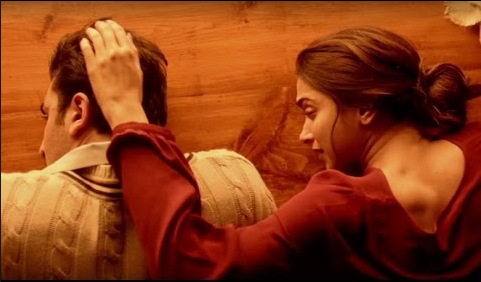There are multiple reasons that lead to the song Agar Tum Saath Ho striking a chord with the public. It is a rich and melodious composition by A.R. Rahman, it seen as the return of Alka Yagnik into mainstream Hindi film songs and the song also marks a critical plot point in the movie (Tamasha). Sensitive performances (especially by Deepika Padukone) give this song another dimension and make it extremely difficult for emotional viewers like myself to hold their tears back. Infact for me, this song sequence is an outstanding highlight of an otherwise average film. But there is more to this song. Let us take a closer look at the lyrics. The woman sings:
Pal bhar thehar jao,
Dil yeh sambhal jaaye,
Kaise tumhe roka karoon?
Meri taraf aata,
Har gham phisal jaaye,
Ankhon me tumko bharoon.
Bin bole baatien tumse karoon,
Agar tum saath ho.
which roughly translates to:
Just wait for few moments; let my heart settle down. How do I stop you from leaving? Let me fill you in my eyes. If you are with me all my sorrows slip away. If you are with me I can talk to you without saying much.
She further adds:
Behti rehti nehar nadiyaan si,
Teri duniya mein .
Meri duniya hai,
Teri chahaton mein .
Mai dhal jaati hoon,
Teri aadaton mein,
Agar tum saath ho.
which translates to:
Your world is filled with rivers and streams; My world is set only where your interests lie. If you are with me, your habits become mine.
While the man keeps repeating:
Teri nazaron mein hai tere sapne,
Tere sapno mein hai naarazi.
Mujhe lagta hai ke baatien dil ki,
Hoti lafzon ki dhokebaazi .
Tum saath ho ya na ho,
Kya fark hai?
Bedard thi, zindagi bedard hai,
Agar tum saath ho.
which basically means:
Your eyes are filled with their own dreams and I can see anger in those dreams. All these talks of love are nothing but deceptive words. What difference does it make if you are with me? My life was merciless and will be merciless even if you are with me.

We can see that the woman is expressing her love and her desire to stay with the man but the man is turning her down. This is a refreshing concept to see in a Hindi film song.
Back in the day, we had enough songs where women used to express love and romance as unabashedly as the men. Lag Jaa Gale, Tere Bina Zindagi Se Koi Shikhwa, Pyaar Kiya Toh Darna Kya? etc are some such examples. However, somewhere and somehow we lost the plot. Most songs started conveying through their lyrics and/or picturization that the burden of expressing love falls only on the guy’s shoulders. He had to ‘impress the girl’. Scenes where a guy follows the girl to impress her while the girl either shows arrogance or blushes became a popular concept so much so that a lot of songs are based on this concept even today.
Take for example, Mai Koi Aisa Geet Gaaon (Yes Boss). Yes, it is a cute song with a catchy tune and Shah Rukh Khan is rather charming here but the problem arises when bulk of songs being produced are based on a similar concept. It gives a wrong idea about gender roles when it comes to romance. Palat Tera Hero Idhar Hai is a recent example. Clearly nothing much has changed except that the lyrics have become ridiculous.
I have heard opinions that call the girl (in Agar Tum Saath Ho) weak and submissive because she says “Mai dhal jaati hoon teri aadaton mein”. The question is when we can accept the guy expressing Tu dil tu hi jaan meri (you’re my heart and my life) in Samjhawaan as romance without passing a judgement on the character then what troubles us when a girl is expressing love with similar intensity? Years of guy-impresses-girl based songs have lead to a rather funny images of a girl in love. She is either classified as ‘Door khadi sharmaaye‘ type or as the haughty who is difficult to please or worst as a ‘bold’ item girl dancing to misogynistic lyrics. We have stopped expecting girls on the celluloid to express deeper emotions when in love.
We produce enough musically and lyrically appealing romantic songs but why is it that in most of these songs the girl merely seems to be replying to a guy’s proposal and more importantly why do we not see girls being turned down by guys more often when girls in reality get a crush and get their hearts broken as often a guy. It is not that we haven’t had such songs at all, but they are few in number and here’s to hoping for more songs (which are not item numbers) where we can see a girl trying to impress a guy or getting rejected by a guy!
Here is the song as it appears in the movie. As I have already stated, I really like the lyrics, performances and camera work in this sequence.


